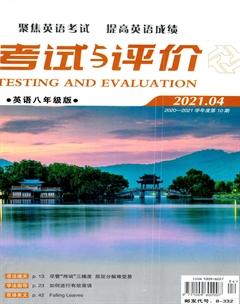Unit 6重点词语解读
曲永华
1. remind v. 提醒;使想起
That song reminds me of my mother. 那首歌使我想起我的妈妈。
【拓展】 remind sb.+ that从句 提醒某人去做某事,使某人想起去做某事
This story reminds us that you can never know whats possible unless you try to make it happen. 这个故事提醒我们如果你不尽力去做就不会知道什么是可能的。
remind sb. to do sth. 提醒某人去做某事
Please remind me to return the books to the library. 请提醒我把这些书还给图书馆。
remind sb. of / about sth. 使某人记起某事
Action movies remind me of Jackie Chan. 动作片使我想起成龙。
2. born v. 出生
Once upon a time, a magic rock opened up and a monkey was born. 从前,一个魔法石裂开了,然后一只猴子出生了。
【拓展】 be born in +月份/年份/地点
My brother was born in Hong Kong. 我的哥哥出生于香港。
be born on +具體的某天
My friend, Henry was born on June 10th, 1999. 我的朋友亨利出生于1999年6月10号。
3. marry v. 嫁;娶;与……结婚
若问某人是否结婚,而不涉及结婚的对象,可用be / get married的形式,相当于系表结构。
Kate and Tom got married last year. 凯特和汤姆去年结婚了。
【拓展】 be / get married to sb. 与某人结婚
She was / got married to an Englishman. 她和一位英国人结了婚。
marry sb. 与……结婚
John married Mary last week. 上星期约翰和玛丽结婚了。
marry sb. to sb. 把某人嫁给某人
She married her daughter to a rich man. 她把她女儿嫁给了一个富人。
4. finish v. 完成
其后可跟名词、代词或动名词作宾语。
We finished the homework this afternoon. 我们今天下午完成了作业。
She was delighted to finish second. 她为竞赛得了第二名而高兴。
When did you finish drawing the picture? 你是什么时候画完那幅画的?
【拓展】 用动名词形式作宾语的常见动词及短语还有:
enjoy doing sth. 喜爱做某事;practice doing sth. 练习做某事;keep doing sth. 一直做某事;mind doing sth. 介意做某事;have fun doing sth. 高兴做某事;feel like doing sth. 想要做某事;cant help doing sth. 禁不住做某事;look forward to doing sth. 盼望做某事
5. voice n. 声音,嗓音
Then they hear an old womans voice from inside the house. 此时,他们听见从房子里面传来一个老妇人的声音。
【拓展】 speak in a low / loud voice 低声/大声地说话;at the top of ones voice 用最大声音
【辨析】 voice, noise, sound的区别
voice一般指人的声音。
Keep your voice down! 小声点!
noise意为“噪声,喧闹声”。
make a noise 制造噪音
sound含义较广,指大自然的各种声音。
the sound of the wind / steps 风声/脚步声
6. cheat v. 欺骗;蒙骗;作弊
They were trying to cheat the emperor. 他们正试图欺骗皇帝。
【拓展】 cheat sb. of sth. 骗取某人的某物
The man cheated the poor man of his money. 这个男人骗取了这个穷人的钱。
7. whole adj. 全部的,整体的,完全的
We spent the whole summer in Italy that year. 那年我们整个夏天都呆在意大利。
【辨析】 all, whole的区别
all意为“整个的,全部的”,强调各个部分组成的整体,可修饰不可数名词或可数名词复数。有冠词、指示代词、所有格等限定词时,all放在它们之前,即“all +限定词+名词”。
Are all the students here today? 今天所有的学生都到了吗?
whole意为“整个的,全部的”,强调完整无缺,不可分割的整体,修饰单数可数名词,有冠词、指示代词、所有格等限定词时,whole放于它们之后,即“限定词+ whole +名词”。
They told me the whole story. 他们给我讲了整个的故事。
8. show sb. the way to... 告知(指引)某人去……的路
Could you please show me the way to the hospital? 您告诉我去医院的路好吗?
【拓展】 show sb. around 带领某人参观
He showed the students around the school. 他领着学生参观了学校。
show sb. sth.=show sth. to sb. 把某物给某人看
She showed us her new phone. 她把她的新手机给我们看。
=She showed her new phone to us.
9. instead of 代替……,取代……
是介詞短语,后面接名词、代词或动名词。
We just had soup instead of a full meal. 我们没有吃全餐,只喝了汤。
Ill go instead of you. 我将代替你去。
Now I can walk to work instead of going by car. 现在我可以步行去上班,而不必开车了。
【拓展】 instead是副词,意为“代替”,在句中用作状语,可置于句末,其前不用逗号;也可置于句首,其后可用逗号,也可不用,起衔接两个句子、分句或短语的作用。
You are busy. Let me go instead. 你忙,让我去吧。
Its too hot to walk. Well go swimming instead. 天太热不宜散步。我们去游泳吧。

